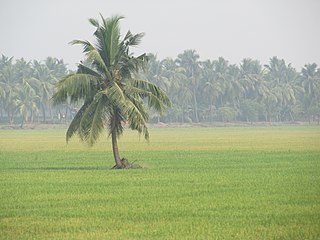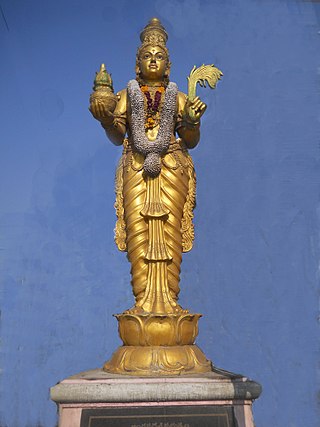Related Research Articles
Kamma is a largely Hindu caste from South India. The community of Kammas is believed to have originated from agriculturists of the Kammanadu region of the erstwhile Guntur district and Ongole division in Andhra Pradesh. Propelled by their military activity in the Vijayanagara Empire, Kammas are believed to have spread out from the region during the Vijayanagara period, followed by some in-migration during the British period and out-migration again during the twentieth century. Today they are regarded as one of the richest groups in Andhra Pradesh and are a dominant caste from Coastal Andhra with socio-economic and political prominence throughout the Telugu-speaking regions of India.

Gurram Jashuva was a Telugu poet. He is legendary figure in the Telugu literary world. With his immense wisdom and through the struggle he faced due to the caste-based discrimination, Jashuva wrote his poetry with a universal approach. He was called the "Poet of the Millennium" for his timeless pieces of poetry and literature.

The West Godavari district is a coastal district in the Indian state of Andhra Pradesh with an administrative headquarters in Bhimavaram. As of the 2011 Census of India, the district has an area of 2,178 km2 (841 sq mi) and a population of 1,779,935. It is bounded by the Krishna district and Bay of Bengal to the south, East Godavari district to the east, and Eluru district, Kolleru Lake and Upputeru Drain to the northwest.
Gudivada is a city in Krishna district of the Indian state of Andhra Pradesh. It is a municipality and the headquarters of Gudivada mandal in Gudivada revenue division. It is one of the cities in the state to be a part of Andhra Pradesh Capital Region. It is the twenty-seventh most populous city in Andhra Pradesh and the three-hundredth most populous city in India with a population of 118,167 according to the 2011 Census of India.

Madiga is a Telugu caste from southern India. They mainly live in the states of Andhra Pradesh, Telangana and Karnataka, with a small minority in Tamil Nadu. Madigas are historically associated with the work of tannery, leatherwork and small handicrafts. Today, most are agricultural labourers. They are categorized as a Scheduled Caste by the Government of India. Within the Madiga community, there are various sub-castes include Bindla, Chindu, Dakkali, Mashti, Sangaris and the priestly class is known as Madiga Dasu.

Karimnagar district is one of the 33 districts of the Indian state of Telangana. Karimnagar city is its administrative headquarters. The district shares boundaries with Peddapalli, Jagityal, Sircilla, Siddipet, Jangaon, Hanamkonda district and Jayashankar Bhupalapally districts.

Nellore district, officially known as Sri Potti Sriramulu Nellore district in Coastal Andhra Region, is one of the 26 districts in the Indian state of Andhra Pradesh. According to the 2011 Census, the district's population was 2,963,557 of which 29.07% was urban. Its administrative headquarters are located in Nellore city. Located in the Coastal Andhra region, the district is bordered by the Bay of Bengal to the east, Kadapa district and Annamayya district to the west, Prakasam district to the north, and Tirupati district to the south.

Prakasamdistrict is one of the twelve districts in the coastal Andhra region of the Indian state of Andhra Pradesh. It was formed in 1970 and reorganised on 4 April 2022. The headquarters of the district is Ongole. It is located on the western shore of Bay of Bengal and is bounded by Bapatla district and Palnadu districts in the north, Nandyal district in the west, Kadapa and Nellore districts in the south. A part of north west region also borders with Nagarkurnool district of Telangana. It is the largest district in the state with an area of 14,322 km2 (5,530 sq mi) and had a population of 22,88,026 as per 2011 Census of India.
The Raju are a Telugu caste found mostly in the Indian state of Andhra Pradesh.
Kapu is a Hindu caste primarily found in the Indian state of Andhra Pradesh. Kapus are classified as a Forward caste, and are a community of land-owning agriculturists. Historically, they also served as military generals (Nayakas) and warriors in Hindu kingdoms such as the Vijayanagara Empire. Kapus are a dominant caste of Andhra Pradesh. They are primarily present in Coastal Andhra, with a major concentration in the Godavari-Krishna delta region. Kapus commonly use the title Naidu.

Gondi (Gōṇḍī), natively known as Koitur, is a South-Central Dravidian language, spoken by about three million Gondi people, chiefly in the Indian states of Madhya Pradesh, Maharashtra, Chhattisgarh, Andhra Pradesh, Telangana and by small minorities in neighbouring states. Although it is the language of the Gond people, it is highly endangered, with only one fifth of Gonds speaking the language. Gondi has a rich folk literature, examples of which are wedding songs and narrations. Gondi people are ethnically related to the Telugus.
Telaga is a land-owning agrarian community primarily found in the Coastal Andhra region of India. Telaga is a subcaste of the Kapu community, with both terms often used interchangeably. They are classified as a Forward caste. Historically, they were a warrior caste known for their honour and bravery.
Settibalija refers to two distinct and completely unrelated communities in Andhra Pradesh, India. The term Setti Balija historically referred to a sub-caste of the Balija community. These Shetty Balijas were a prominent mercantile community of South India with a history dating back to the Vijayanagara Empire. They are currently found in the Rayalaseema region and are classified as a Forward Caste.
Those with the last name Nanduri are said to hail from the village of Nanduru which is near Bapatla and Ponnur, small towns in the Guntur District of Andhra Pradesh, India. There is a village called Nanduru in East Godavari District of Andhra Pradesh as well which leads to some ambiguity.

Malaysian Telugus, consist of people of full or partial Telugu descent who were born in or immigrated to Malaysia. Most Malaysian Telugus are descended from migrants from Madras Presidency during the colonial period. Historically, most Malaysian Telugus originated from the Uttarandhra region with some from the East Godavari and Chittoor regions of present-day Andhra Pradesh.

Kalyanam Raghuramaiah (1901–1975), popularly known as Eelapata Raghuramaiah, was an Indian actor, and thespian known for his works in Telugu cinema, and Telugu theatre. A recipient of the Sangeet Natak Akademi Award, and the Padmashri, He was known for the roles of Krishna or Dushyantha, Bhavanisankar, Narada etc. He performed those roles for about 60 years. He indulged in elaborate raga alapana, based on different ragas while rendering padyams.
Muthuraja is a Tamil and Telugu speaking community found in the Indian state of Tamil Nadu.
The Sabariya (Savaria) are a Gond people of Janjgir-Champa district in Chhattisgarh state of India.

Konaseema district, is a district in Konaseema region of Andhra Pradesh in India. It is situated between the tributaries of the Godavari River in the Coastal Andhra. It was carved out of East Godavari district on 4 April 2022 by the Government of Andhra Pradesh. Amalapuram is the district headquarters and the largest city in this district. The district shares boundaries with West Godavari, East Godavari and Kakinada districts.

Sri Sathya Sai district is a district in the Indian state of Andhra Pradesh. Its headquarters is at Puttaparthi. It was formed on 4 April 2022 from parts of the erstwhile Anantapur district.
References
- ↑ Pattapu at Ethnologue (26th ed., 2023)

- ↑ Ruth Rebbavarapu (19 July 2013), Request for Change to ISO 639-3 Language Code: Change Request Number: 2013-020 (PDF) (in English and Pattapu), ISO 639-3 Registration Authority, Wikidata Q130343748
{{citation}}: CS1 maint: unrecognized language (link) - ↑ "'పట్టపు' భాష మాది! | - | Sakshi" [The language of 'Pattapu' is ours]. Sakshi (in Telugu).
- ↑ "అనగనగా ఒక ఊరు.. అందరిదీ ఒకేమాట | Pedda Pattapu Palem All Sarpanches Were Unanimously Elected | Sakshi". www.sakshi.com (in Telugu). Retrieved 25 December 2024.